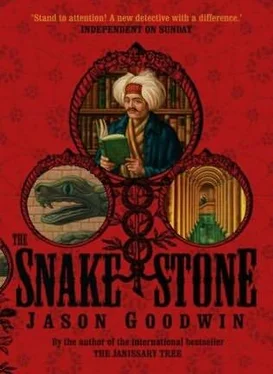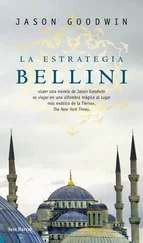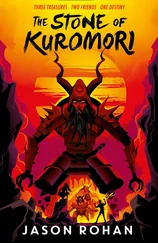Jason Goodwin - The snake stone
Здесь есть возможность читать онлайн «Jason Goodwin - The snake stone» весь текст электронной книги совершенно бесплатно (целиком полную версию без сокращений). В некоторых случаях можно слушать аудио, скачать через торрент в формате fb2 и присутствует краткое содержание. Жанр: Исторический детектив, на английском языке. Описание произведения, (предисловие) а так же отзывы посетителей доступны на портале библиотеки ЛибКат.
- Название:The snake stone
- Автор:
- Жанр:
- Год:неизвестен
- ISBN:нет данных
- Рейтинг книги:4 / 5. Голосов: 1
-
Избранное:Добавить в избранное
- Отзывы:
-
Ваша оценка:
- 80
- 1
- 2
- 3
- 4
- 5
The snake stone: краткое содержание, описание и аннотация
Предлагаем к чтению аннотацию, описание, краткое содержание или предисловие (зависит от того, что написал сам автор книги «The snake stone»). Если вы не нашли необходимую информацию о книге — напишите в комментариях, мы постараемся отыскать её.
The snake stone — читать онлайн бесплатно полную книгу (весь текст) целиком
Ниже представлен текст книги, разбитый по страницам. Система сохранения места последней прочитанной страницы, позволяет с удобством читать онлайн бесплатно книгу «The snake stone», без необходимости каждый раз заново искать на чём Вы остановились. Поставьте закладку, и сможете в любой момент перейти на страницу, на которой закончили чтение.
Интервал:
Закладка:
“I don’t know what you’re talking about,” Millingen said furiously. “Petros!” He got up quickly and bellowed at the door. “Petros!”
There was a sound of rushing feet outside. To Yashim, it sounded as if someone were going up the stairs-and again, that curious swishing noise he’d heard before. But then Petros appeared, looking alarmed.
“This gentleman is leaving,” Millingen said crisply. “Show him the door, Petros.”
106
The Suleymaniye Mosque stands on the third hill of Istanbul, overlooking the Golden Horn. Built by Sinan, the master architect, for his patron, Suleyman the Magnificent, in 1557, it reflects all the piety and grandeur of its age. Some of the foremost scholars of Islam toiled in its medresse or consulted its well-stocked library; its kitchens fed over a thousand mouths a day, in charity; and its central fountain, in the Great Court, gladdened the hearts of the faithful and cooled the hands and faces of shoppers emerging from the Grand Bazaar nearby.
When, in the course of the morning, the spurting jets of the fountain declined to a mere dribble, it aroused irritation-and some anxiety. Some of the faithful objected that the water could not be very fresh; some of the more superstitious wondered if the unspoken crisis was approaching, and asked for news of the sultan’s health.
Fifty feet or so beneath the ground, in a spur off the main pipe that Sinan had himself constructed, water was backing up against an unusual obstruction, formed at a point where two pipes of a different gauge met. The obstruction at first was merely a tangled mass of wool and loose stones, but it became a nuisance only later, when it was compounded by the drifting corpse of a former waterman called Enver Xani. Xani filled the hole quite neatly; and as the water level rose, so the blockage of bloated flesh and wool and stones was jammed ever more firmly against the narrow lip of the smaller pipe. It became the perfect seal.
The dribble of water from the fountain of the Suleymaniye eventually stopped flowing altogether; but the sultan, according to reports, was still alive.
107
Yashim sat in the sunshine, nursing his coffee. He ordered some baklava; the hours in Millingen’s sunless study had drained him of energy.
An elderly Greek, bent at the waist, hands clasped behind his back, was coming down the side of the road. He wore a red fez, a long jacket, and white pantaloons. Every so often he stopped to look in a shop window or craned his neck to inspect some new building work; once he turned around completely to follow the swaying hips of a pretty Armenian woman with a basket and her hair in a plait. His blue eyes sparkled under a pair of bushy white eyebrows. When he caught sight of Yashim he stopped again, smiled, and raised those eyebrows slightly, as if they had shared a joke together, or a regret, before resuming his stately progress down the Grande Rue de Pera.
A group of Franks, led by a man with a huge belly who mopped his brow repeatedly with a handkerchief, sauntered along the road. The men wore black coats and striped waistcoats; the ladies wore bonnets and turned their heads about, like blinkered horses. Yashim couldn’t catch what they were saying but guessed they were Italians, probably staying at one of the new lodging houses higher up the street; their dragoman carried a fly whisk and wore a mustache. Yashim wondered if he was Greek, but thought not: more likely an Italian-speaking native of Pera, descended from the city’s original Genoese inhabitants.
It seemed to Yashim that he had once been able to glance at people’s feet to tell who they were, and where they belonged. In Fener or Sultanahmet, perhaps, but in Pera, no longer. The distinctions blurred; the categories no longer held. That lanky figure in a Frankish suit-was he Russian? Belgian? Or an Ottoman, indeed-a Bosnian schoolmaster, perhaps, or a Russified Moldavian shipping agent?
The baklava was hard and sticky; it was made, he suspected, with sugar syrup as well as honey.
And where did he stand, among these people whose origins were so clouded and confused?
Years ago, Yashim supposed, the distinctions had been simple. You were born to a faith, and there you lived and died. It was given to very few-Yashim among them-to change their state in life. But now people cast their skins, like snakes. Lefevre was Meyer. Istanbul was Constantinople. A lecherous bully became a priest, and Millingen was the Hetira-a revolutionary organization that on close inspection turned out to be an antiquarian club. Sometimes the only evidence of their presence was the outer layer of their skin, shed as they moved from one incarnation to another. Perhaps the old prophecy was true: with the Serpent Column destroyed, Istanbul had become overrun.
He thought again about Lefevre. He had spoken of his passion for Istanbul, for the layers of history that had built up on the shores of the Bosphorus, at the point where Asia and Europe met, and the Black Sea flowed into the Mediterranean. A man and a city whose identities had been reshaped. Constantinople, or Istanbul. Meyer, or Lefevre.
Yashim sighed, drawn in spite of himself to acknowledge an affinity with the dead man. Yashim the boy, expecting to become a man-the man he did not, in the end, quite become-was the memory of a self that clung to him the way the serpents coiled together on the Hippodrome. The snakes had had their three heads and their three coils, but they occupied the same space, in a single column.
Meyer. Lefevre. Could it be that there was, perhaps, a third aspect to the man? He had a fleeting vision of the dreadful corpse, as fanged and terrible as a serpent’s head itself.
What was it that Grigor had said? That a city doesn’t change because you change its name. A city is not a name: it’s a sequence of lives, gestures, memories, all entwined. Lefevre found stories in its rubble; for Yashim, these stories were found in the voices you heard on the street, in the murmur that surrounded mosques and markets, in a tired boy leaning his burden against a dirty wall, a cat jumping after bats in the dark, the curve of a caique rower’s back.
A city endures which also grows, forever adding new identities to the old. To a Parisian, Istanbul was the East. To an Indian, it was the West. What of the Jews, clustered in Balat-did they live in a Jewish city? Did Preen see a city of entertainers? Or the valide a city of palaces and concubines?
One day, if men like Dr. Stephanitzes had their way, Istanbul could revert to being the capital of Greece. They could tear down the minarets, exchange the crescent for the cross, but Suleyman’s Muslim city would still survive, nestled into the very fabric of the place, submerged like the cisterns of Byzantine Istanbul.
This city, Yashim reflected, was very resilient. A survivor.
Like Lefevre himself.
108
“I didn’t think we’d see each other again,” Grigor said.
“We still share this city.”
Grigor sighed. “In space, Yashim, and time. But here?” He jabbed his thumb to his chest. “Or here?” And he placed his index finger to his temple.
Yashim bowed his head. “We share-certain responsibilities, at least.”
“To whom?”
Yashim heard the sneer in Grigor’s voice.
“To the dead, Grigor.”
Grigor put up a hand and ran his fingers through his beard.
“Experience has taught me that we should keep to our own spheres. Our own circuits. There are boundaries in Constantinople: beyond them we trespass at our peril.”
“You told me before that the church is concerned with the things of the spirit,” Yashim answered carefully. “Caesar wants obedience. But God wants Truth, isn’t that so?”
Grigor made a dismissive motion with his hand. “I don’t think God is very interested in your sort of truth, Yashim. It’s very small. Who did what to whom-who talked, who was silent, the year 1839. God is the Eternal.”
Читать дальшеИнтервал:
Закладка:
Похожие книги на «The snake stone»
Представляем Вашему вниманию похожие книги на «The snake stone» списком для выбора. Мы отобрали схожую по названию и смыслу литературу в надежде предоставить читателям больше вариантов отыскать новые, интересные, ещё непрочитанные произведения.
Обсуждение, отзывы о книге «The snake stone» и просто собственные мнения читателей. Оставьте ваши комментарии, напишите, что Вы думаете о произведении, его смысле или главных героях. Укажите что конкретно понравилось, а что нет, и почему Вы так считаете.












